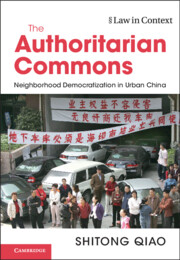
-
Select format
-
- Publisher:
- Cambridge University Press
- Publication date:
- 21 December 2024
- 09 January 2025
- ISBN:
- 9781108885416
- 9781108840279
- Dimensions:
- (244 x 170 mm)
- Weight & Pages:
- 0.62kg, 264 Pages
- Dimensions:
- Weight & Pages:
You may already have access via personal or institutional login
Book description
Based on six-year fieldwork across China including over 200 in-depth interviews, this book provides an ethnographic account of how hundreds of millions of Chinese homeowners practice democracy in and beyond their condominium complexes. Using interviews, survey data, and a comprehensive examination of laws, policies and judicial decisions, this book also examines how the party-state in China responds to the risks and benefits brought by neighborhood democratization. Moreover, this book provides a framework to analyze different approaches to the authoritarian dilemma facing neighborhood democratization which may increase the regime's legitimacy and expose it to the challenge of independent organizations at the same time. Lastly, this book identifies conditions under which neighborhood democratization can succeed.
Reviews
‘In this fascinating study, Qiao documents and insightfully analyzes how the development of homeowners’ associations (HoAs) in China generated an ongoing democratic revolution in hundreds of thousands of neighborhoods. This book is a must-read for students of China, of the emergence of democracy, and of property theory.’
Hanoch Dagan - UC Berkeley School of Law
‘To truly know a country, you have to know how it divides up control and power over that one universal asset: land. The Authoritarian Commons: Neighborhood Democratization in Urban China is a brilliant study of the fights over, and the startling persistence of, homeowners’ associations in China. It is essential reading for anyone who wants to understand either modern China or the relationship between local and national governance more broadly.’
David Schleicher - Professor, Yale Law School
‘By showing us how Chinese homeowners have been able to develop a rich and effective associational life, Qiao opens up a new lens for our understanding of Chinese authoritarianism. A superb and illuminating study that will be of interest to property scholars as well as students of authoritarian governance.’
Tom Ginsburg - Leo Spitz Distinguished Service Professor of International Law, Ludwig and Hilde Wolf Research Scholar, The University of Chicago Law School
‘Shitong Qiao’s insightful book presents a compelling examination of how homeowners’ associations (HoAs) have evolved into entities that negotiate with state authority, reshaping the governance of urban communities. Through detailed case studies of Beijing, Shanghai, and Shenzhen, Qiao examines how property rights, local governance, and civic engagement intersect, offering an invaluable lens on civic participation under an authoritarian regime. In particular, Qiao’s study of the HoAs’ role during China's COVID lockdowns highlights the capabilities and limits of self-governance in urban neighborhoods.’
Dali L. Yang - William Claude Reavis Professor of Political Science, The University of Chicago, and author of Wuhan: How the Covid-19 Outbreak Spiraled out of Control (2024)
‘In The Authoritarian Commons, Qiao skillfully analyzes the burgeoning democracy of HoAs in urban China, a reality that is paradoxically both needed and feared by the authoritarian state.’
Yu Xie - Department of Sociology, Princeton University
‘China’s turn to permitting private condominium homeownership presented urban authorities with competing concerns: they could not easily exercise minute control over condominiums, particularly by comparison to better-informed and highly motivated homeowners’s associations (HOAs); but at the same time, they faced a threat of losing control vis-à-vis HOAs. Shitong Qiao’ fascinating book studies three cities where Chinese authorities have made very different tradeoffs on these issues, with correspondingly different responses by condominium owners. More fundamentally, his book reveals an underlying governmental motivation to maintain an appearance of legality, even in an authoritarian regime. To varying degrees, HOAs in large Chinese condominium developments have leveraged this motivation to establish varying degrees of self-government, up to and including some resistance to authorities. What is more surprising is that, in comparing the approaches of these three different cities, Qiao has found that the looser the reins of governmental authority, the greater the HOAs' own commitment to legality—and the less likely that their members protest extralegally.’
Carol M. Rose - Gordon Bradford Tweedy Professor Emeritus of Law and Organization, Yale University
‘… the most ambitious book yet on this topic. It has several special merits, starting with the author’s clear enthusiasm for the material. He situates it within a broader world of ideas, particularly liberal thinking (old and new) about the ways in which property rights underpin autonomy and democratic participation. … a fine and lively overview of the state of play so far.’
Benjamin L. Read Source: The China Quarterly
Contents
Metrics
Altmetric attention score
Full text views
Full text views help Loading metrics...
Loading metrics...
* Views captured on Cambridge Core between #date#. This data will be updated every 24 hours.
Usage data cannot currently be displayed.
Accessibility standard: Unknown
Why this information is here
This section outlines the accessibility features of this content - including support for screen readers, full keyboard navigation and high-contrast display options. This may not be relevant for you.
Accessibility Information
Accessibility compliance for the PDF of this book is currently unknown and may be updated in the future.


